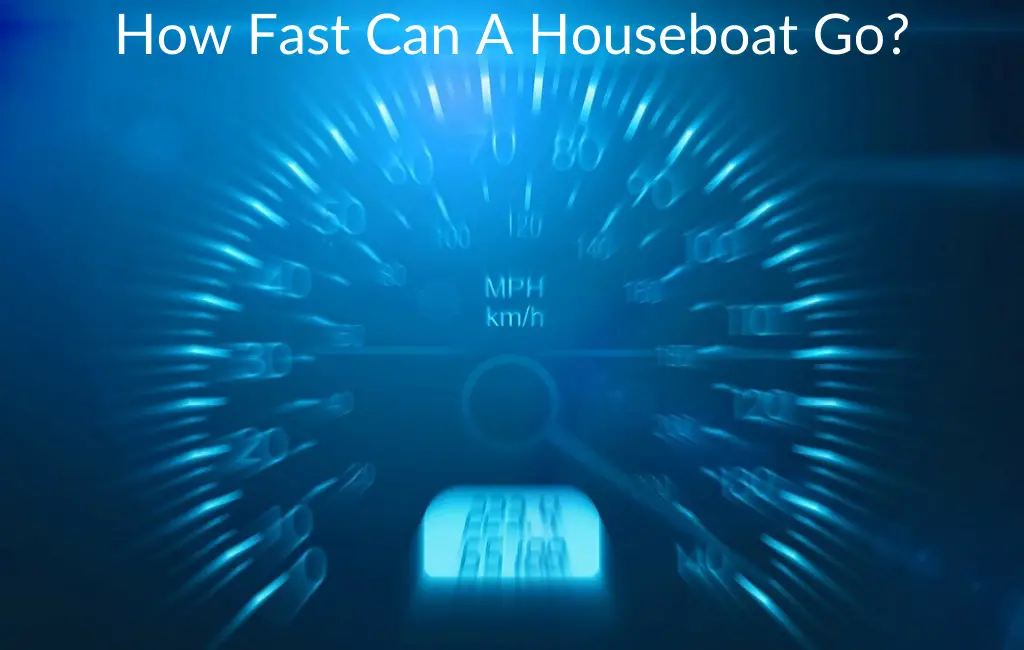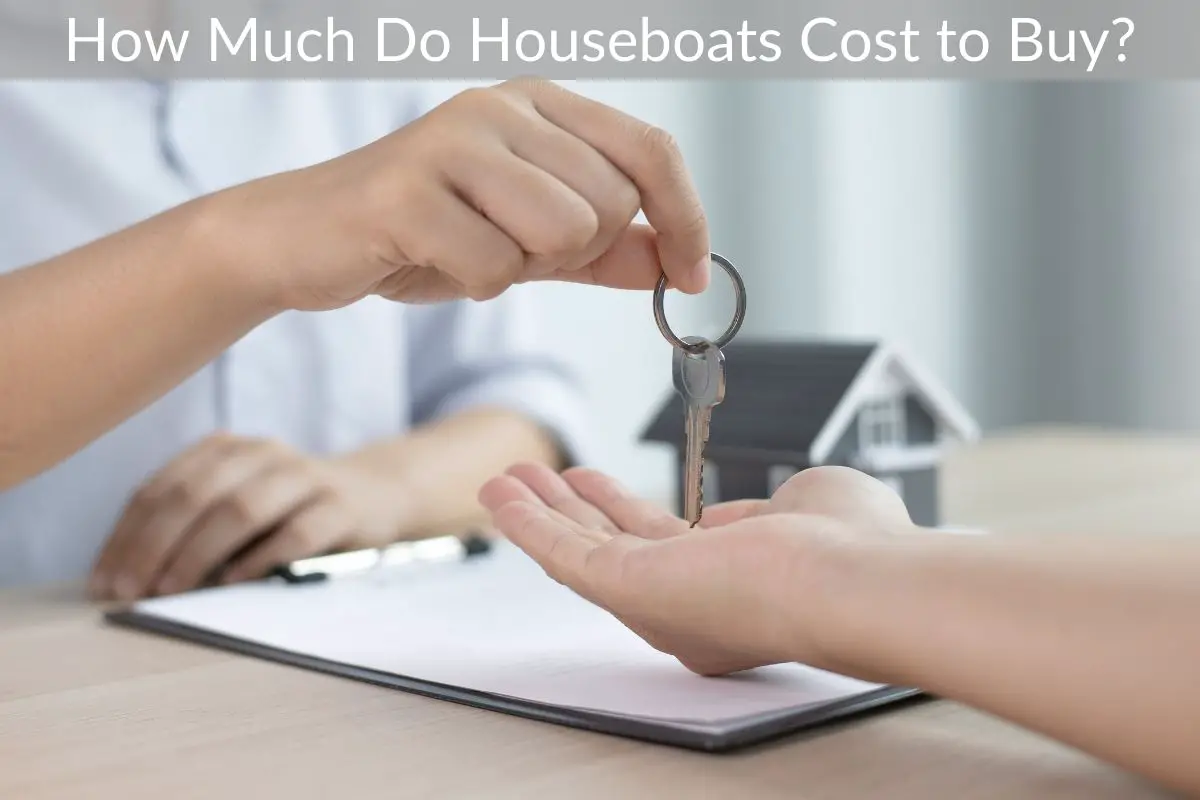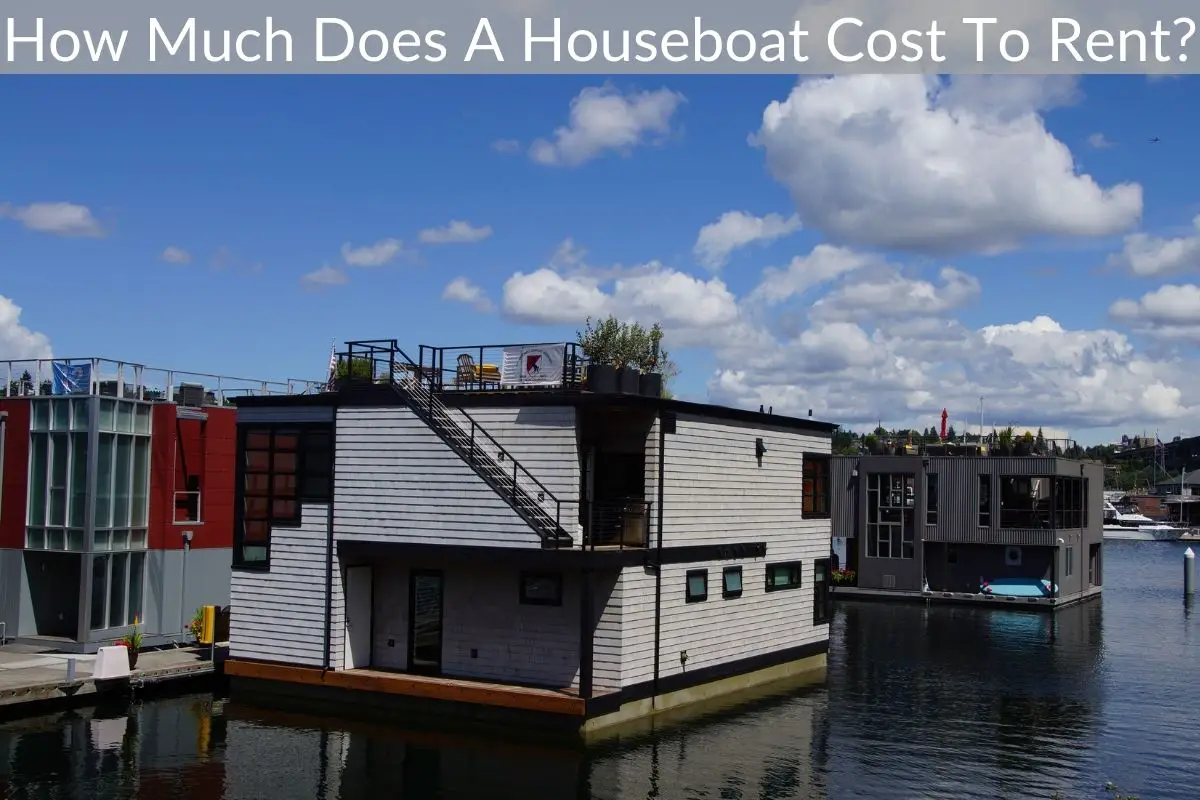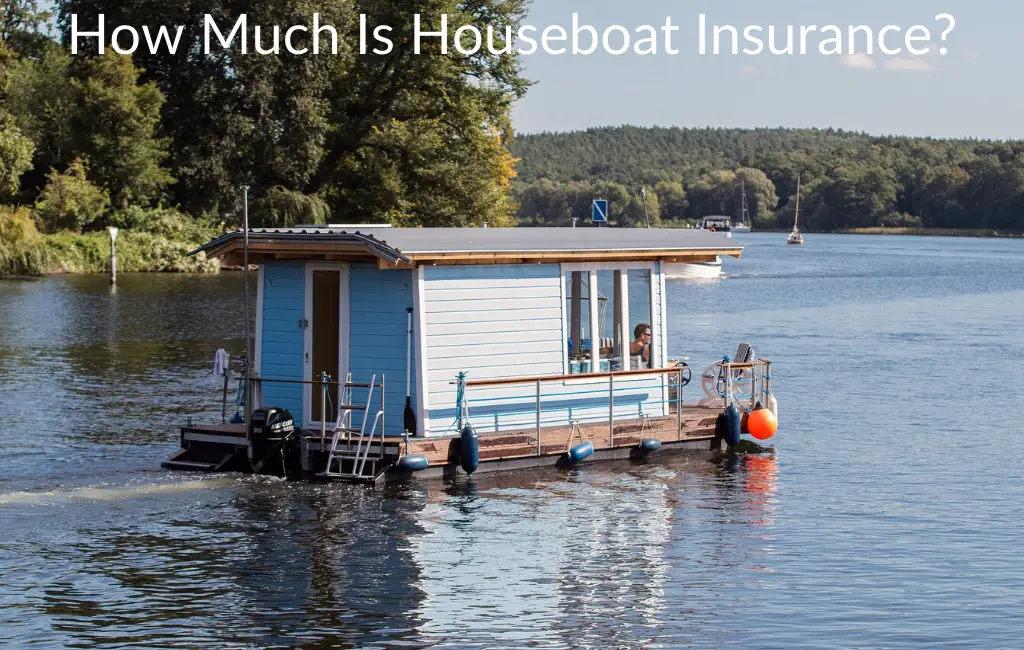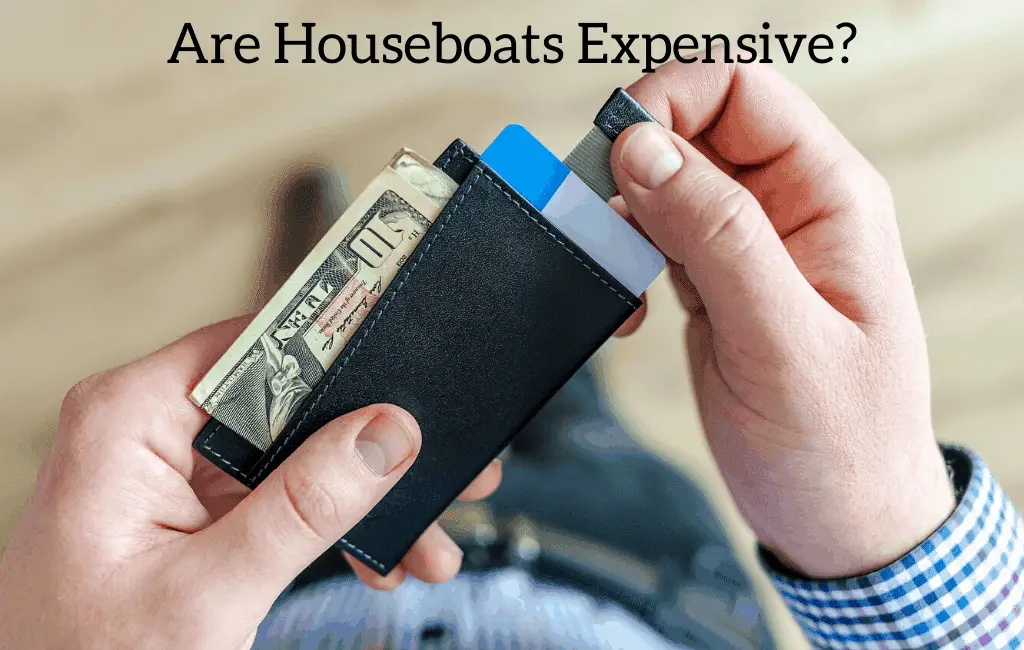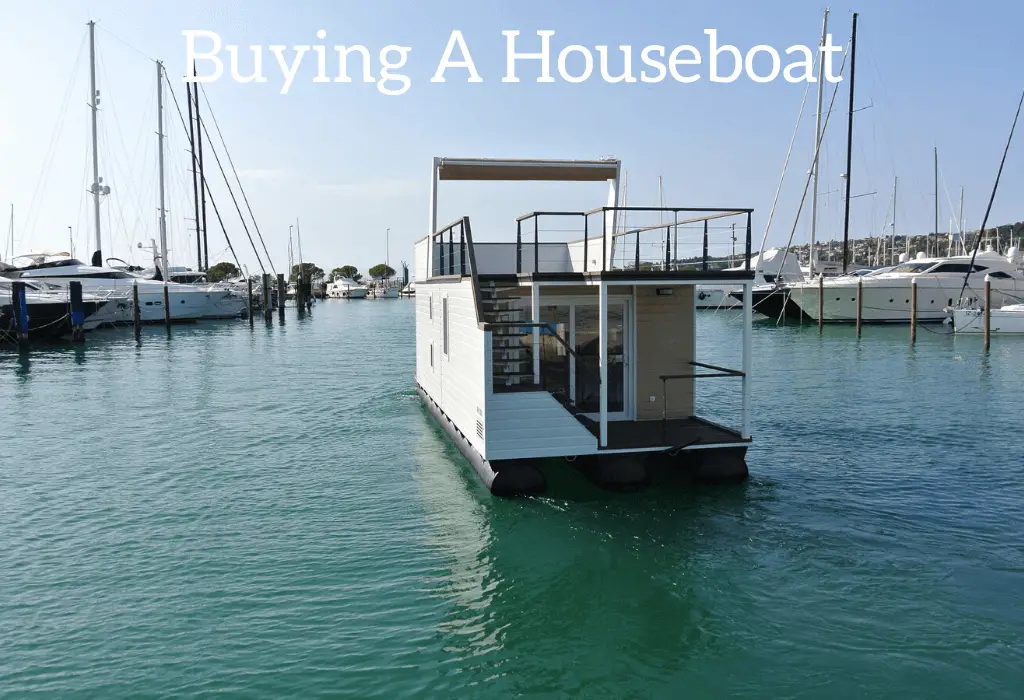If you just bought a houseboat, or are looking to buy one, you have probably wondered about its fuel usage. This can be an important stat when buying a houseboat or just renting one.
*This post may contain affiliate links. As an Amazon Associate we earn from qualifying purchases.
This article will help to answer the most common questions about houseboat fuel.
How much fuel does a houseboat use?
Most houseboats will use 2-4 gallons of fuel per hour if you are traveling at 7-10mph. That comes out to an average MPG (miles per gallon) of 2 to 3.
Each boat is different so your fuel usage could be higher or lower depending on your
- RPMs
- Weight on board
- Boat design
- Water conditions
- Boat speed
- Boat size
These and other factors can greatly impact your houseboat fuel milage. In this article we will try and cover everything that you might need to know about fuel and your houseboat.
As we go along in this article we will build step by step so that by the end you should know not only how much fuel you will use but also how long you can be on the water before refueling. Each houseboat will be different but we will give a couple examples of different sizes to give you a general idea for your boat.
If you are thinking of buying a houseboat, you might be wondering how much fuel does one use on a daily basis. The answer to that question will depend on several factors. The size of the house boat will affect how much fuel it needs. The speed at which you move will also impact the amount of fuel your boat consumes.
To maximize your fuel economy, set up a trip itinerary and stick to it. If possible, carry less weight when you are out on the water. Lighter boats have better mileage per gallon. To save fuel, consider reducing your warm up time. Newer engines require less warm-up time.
Propane
If you’ve ever been on a houseboat, you know that the price of fuel can be expensive. Propane is a non-toxic gas that vaporizes if accidentally released. It also burns cleanly and emits very low levels of sulfur and nitrous oxide. That’s why propane is a sustainable energy choice for sensitive marine environments. But how much propane do houseboats use?
A typical houseboat uses between two and four gallons of fuel per hour when cruising at 7 to 10 mph. In terms of MPG, houseboats can average about two or three gallons of fuel per hour. Fuel efficiency varies based on factors like speed, fuel type, and boat size. Generally, a houseboat fuel tank lasts between 15 and 20 years when well-maintained.
Diesel
How much diesel do houseboats use? That is the burning question on most boat owners’ minds. Although it is true that diesel engines are more expensive, they are less likely to redline or go red. It is hard to say exactly how much fuel a houseboat uses, especially if you’ve never used one. Fortunately, many houseboat manufacturers are introducing new models that are more fuel-efficient.
Depending on the size and horsepower of the engine, houseboats can use very little fuel, considering their size. The size of the engine and hull shape determine fuel consumption. Barges of less than 20 metres can use around two litres per hour. Those of 30 to 40 metres can use between four and eight litres. Thankfully, most houseboat engines are low-revving and have moderate fuel consumption at normal cruising speeds (9-12kph).
Inboard houseboat motors are common and can be found on both large and small vessels. They are recessed into the floor or in a separate compartment. Inboard motors are more fuel-efficient than outboard motors and last for thousands of hours before needing a major overhaul. Unlike outboard motors, inboard motors also provide a handy backup generator for charging batteries. This feature allows owners to save on fuel by reducing trip distances.
Water
You may be wondering how much fuel houseboats use. The average houseboat will use between 33 and 50 gallons of fuel every 100 miles. While this is true for newer houseboats, you should always do your research and test drive a used boat before buying it. A boat’s fuel tank will last between 15 and 20 years, provided you maintain it properly. You should also ask for a test drive to ensure that you don’t notice a huge difference in fuel consumption after a single trip.
A 46-foot houseboat on Trinity Lake in Northern California is owned by Jeff Pauli. To save money, he buys gas for his houseboat at a roadside gas station and carries it onboard to avoid paying $4.25 per gallon at a marina. Instead of paying more than $500 for gas, he moors his houseboat in a small cove three miles from the harbor. Pauli estimates that he uses no more than 5 gallons of gasoline a weekend. Houseboat manufacturers say this is not unusual, but a wealthy boat owner may not care about gas costs.
The fuel consumption of a houseboat depends on many factors, including the length of sail and the miles traveled. A typical car will use 30 to 40 gallons of gasoline for a hundred miles. However, you can fly 100 miles in your car for as little as $10 or $15. While houseboats aren’t as efficient as cars, the cost of operating one is considerably lower than driving the length of the Mississippi. And diesel engines are typically more fuel-efficient than gasoline-powered engines, so their fuel efficiency is more than adequate.
Barges
If you’re considering purchasing a houseboat, you probably want to know how much fuel they use. New houseboats tend to use less fuel than older models, but it’s still best to check the EPA mileage ratings before you purchase. Even if a houseboat has low gas mileage, a lower EPA rating doesn’t mean it’s a bad boat. You can ask the seller to let you try it out for two hours before you buy it.
Unlike other types of boats, houseboats use two fuels: unleaded and diesel. Houseboats also have large holding tanks, so they don’t need to pump effluent out. However, if you’re going to be on the water for extended periods of time, you may want to include bottled water in your shopping. If you need to pump out the effluent, there are several things to consider.
Houseboats use around two to four gallons of fuel per hour while cruising. However, if you’re cruising at seven to ten mph, you’ll probably get two to three MPG. Of course, fuel consumption will vary depending on a number of different factors, including engine type, driving style, and speed. You may also find that houseboats with a diesel engine tend to get better fuel economy.
Rental contracts
Houseboats are not evenly sized rooms. There are bedrooms, decks, and sometimes sleep cushions. In the rental contract, the responsible party is called the “treasurer.” Parents often play the role of responsible party for big families. How much fuel do houseboats use? In order to find out, you’ll need to know the square footage of the various spaces. This information is critical to negotiating the price of your rental.
A houseboat’s rental price includes the cost of gasoline, gas, taxes, fees, and the deposit. During the rental period, you must make sure the fuel tank is full. You must also fill the fuel tank when you return the houseboat. Houseboats run on fuel, so fill it when you rent the boat. It’s important to pay attention to rental contracts as some have age restrictions.
What are houseboat gas tanks made of?
Houseboat fuel tanks are normally made of:
- Plastic
- Fiberglass
- Aluminum
Which material is best for your fuel tank is up for debate, but most manufacturers prefer using aluminum. It is often used because aluminum is lightweight as well as corrosion resistant. The downside to an aluminum tank is it isn’t corrosion proof like the other two options. If I had to replace the tank on my houseboat, I would go with one of the corrosion proof options.
As long as you have a newer boat (less than 10 years old) you should be fine for multiple years as most boat fuel tanks last 15-20 years. If your boat is older and hasn’t been replaced be sure and look at all of your options to get a tank that will be maintenance free or at least low maintenance.
What size fuel tanks do houseboats have?
Each houseboat will have a different tank size depending on how big the boat and the boat manufacturers. Most houseboats will have fuel tanks somewhere between 175 and 250 gallons. Some houseboats will have 2 smaller tanks and some will have one larger one but in general they will be around that size.
How far can a houseboat travel on a tank of fuel?
To figure out the houseboat fuel consumption we are going to have to make some assumptions about what fuel milage you are going to get, which as mentioned above can vary based on a lot of factors. We will assume that you will get 3MPG for your houseboat gas mileage which means for a fuel tank of 200 gallons you would get up to 600 miles.
Now that is just the actual miles traveled with the boat. When you are anchored or beached you will use fuel for your generators so if they run off the same fuel tanks you must take that useage into account as well.
If you are planning on traveling 100 miles a good estimate would be that your houseboat will burn around 33 gallons of fuel. After you have taken your boat out on a couple of trips you will be able to get accurate data for your boat specifically.
Houseboat running costs
The costs to run your houseboat is mainly dependant on how long your travel and for how many miles. If you just take your boat a few miles up river before anchoring or beaching your boat then the fuel costs will obviously be much lower than if you are traveling the entire length of the Mississippi.
We will go back to that 100 mile example used above. If you travel 100 miles you will burn around 30-40 gallons of fuel to travel that distance. A 100 mile trip would take 2-3 days so assuming you will use an on board generator while anchored at night that would add another 5-10 gallons of fuel (less if you use a 3000-4000 watts inverter generator, more if you have a large generator).
The total fuel used for the 100 mile trip would be approximately 40-50 gallons. I will estimate the houseboat gas cost (or diesel cost) at an average of $4 a gallon. That would cost you $160-$200 for a 100 mile trip for your motors and generators.
Houseboating certainly isn’t the most cost efficient way to travel as you can go 100 miles in most cars for $10-$15 but you get to enjoy the water and the scenery along the way when on your boat.
Gasoline vs Diesel Engines
Whether your boat is a gas or diesel can be a big factor in your boat’s fuel usage. Although diesel engines are more efficient motors overall they do come with some cons.
Diesel motor cons
- Diesel motors are louder than a gasoline engine. When you are cruising down river on your new houseboat you will want to be able to hear everyone talking but depending on your RPM that can be difficult with a diesel engine.
- Diesel motors are often more expensive up front. They can often run 2-3x more expensive than a gas motor when being purchased new.
Diesel motor pros
- Diesel motors are more fuel efficient than their gas counterparts. They can be anywhere from 10-20% cheaper to run than a gasoline engine
- Diesel motors have more torque and horsepower available. There is a reason why the big semi trucks have diesel motors and not gasoline. Diesel motors on boats can move that boat far better. This is especially true if you have a larger boat.
In my opinion, a gasoline motor is the way to go if you have a houseboat that is under 30-35’. Anything over that and I would go with a diesel for the added power. The extra expense of a diesel will be worth it to not have a smaller engine redlining the entire time you have it on the water.
Houseboat fuel usage is something that is hard to pin down exactly since it can vary greatly by all the factors mentioned at the beginning of this article.
If you haven’t bought your boat yet it is a great idea to find a boat that is more fuel efficient as the biggest expense you will have for your boat will be your fuel costs. (assuming you are actually using your boat regularly)
They are constantly coming out with new technology so often the newer your houseboat is the better the fuel economy will be. This isn’t always true but it is a factor you should weigh when purchasing your houseboat.
If you are buying a used boat from someone and you can’t find the fuel consumption online or from the manufacturer, ask to test the boat out for a couple of hours. This is a great option to find how much your fuel costs would be.
Most owners won’t mind you taking it out for a bit especially if you assure them you will cover the fuel costs. Make sure the tanks are full before leaving and then refuel once you finish your trip. You can easily figure out the fuel expenses for that boat if you keep track of the hours you spent and the miles you travel on the “test drive”.
I hope this article has been helpful in your houseboat journey. As always be sure and do your homework before making any purchase decision. A houseboat isn’t something you should purchase after looking at it once.
Diesel engines are more efficient than gasoline engines
Generally, gasoline and diesel engines provide the same amount of power, but gas is lighter and more volatile. Diesel, on the other hand, is denser and contains more energy. In addition, diesel fuel has higher energy density compared to gasoline, meaning it can generate more power per gallon of fuel. Lastly, diesel fuel travels farther per gallon than gasoline, which means that a diesel engine will consume less fuel than a gasoline engine.
The primary difference between gas and diesel engines is their compression ratio. Gas engines use a spark to ignite the mixture, while diesel engines burn compressed air. While both are efficient, gasoline engines have a shorter life span. The cylinder will show wear and lose efficiency after a few hundred thousand miles. By contrast, a diesel engine can run for more than a million miles. Furthermore, a diesel engine cylinder can be replaced if it is damaged.
Houseboat owners may be tempted to purchase a diesel-powered boat with a gasoline engine in order to save money. But in reality, diesels are not always cheaper. For example, a diesel engine costs about $16,000 more than a gasoline-powered Crusader 320-hp. On the other hand, a Yanmar Diesel costs $38,245 compared to $11,587. Although diesels cost less in the long run, they are more expensive than gasoline engines.
Houseboats can run on very little fuel considering their size and shape. But the fuel consumption depends on the type of engine used, hull shape, and weight of the boat. Barges under 20 meters will use two to six litres of fuel per hour, while boats 30 metres and above will consume around six to twelve litres of fuel. Diesel engines also consume less fuel at normal cruising speeds (9-12kph).
Propane is safe to use for up to 90 days on a houseboat
While propane is odorless, it is still necessary to know that a vapor detector can warn you of a potentially dangerous situation. A small sensor is usually mounted low in the accommodation space, near a propane appliance, and connected to an alarm panel. The alarm will either sound a buzzer or a bell, or it will turn off the propane solenoid at the tank.
Propane is heavier than air, so if it escapes, it will sink to the lowest point, which is the bilge. A leak may also be explosive, and the vapors can cause serious injuries. Propane, also known as LPG, is considered safe for up to 90 days on a houseboat. It comes in handy cylinders, and is readily available.
Cost of renting a houseboat
Houseboats come in different sizes and have varying capacity. Some have only one private room, while others have bunk beds and a full floor. You may choose a luxury houseboat for up to six people or a smaller houseboat for two people. The initial cost of renting a houseboat is less than that of an apartment. Most lakes pull rental houseboats out of service before winter. When planning your vacation, consider the rental costs in relation to the number of people staying on it.
Prices can vary greatly, depending on the season and the number of people renting the houseboat. A two-bedroom houseboat in Friesland, for instance, will cost you around $159 per day. The same boat can cost you as much as $1740 a week in high season. Prices will go up again in the winter when you’ll need to use a heater that uses electricity. But don’t worry – most marinas include this cost in your mooring fee.
Houseboat rental rates vary a great deal, but they generally range from $1200 to $800 for a three-day trip. The length of the trip and the type of boat will also influence the price. Rentals usually last three, five, or seven days, and a week on a lake may cost up to $450, so the cost will vary significantly. However, you may be able to get a much lower rate by renting a houseboat for a longer period of time.
While houseboats can be costly, the benefits of renting a houseboat far outweigh any inconveniences they come with. You’ll enjoy the water scenery and won’t have to worry about worrying about docking fees. Most houseboats can accommodate six people, with separate sleeping areas, kitchens, and linen service. Some houseboats even have hot tubs for a small fee. There are some additional costs to consider when renting a houseboat, but a houseboat is definitely an investment that is worth the money.
Tips for maintaining fuel efficiency on a houseboat
As the cost of fuel continues to rise, boaters are eager to find ways to reduce their gas costs. One way to save money on gas is to drive fairly slowly. Avoid fire-walling the throttle, which increases gas consumption. Experiment to find your sweet spot. Clean the hull of your houseboat to reduce drag and increase fuel efficiency. By following these tips, you can increase the overall fuel efficiency of your houseboat and save money on fuel.
The size of your fuel tank will vary from boat to boat, but generally, houseboats use between 2-4 gallons of fuel per hour at 7 to 10 mph. This means you can expect to get two to three MPG while cruising. However, the fuel tank of a houseboat can take up to 15 years, depending on its size. Keeping it clean and well maintained can prolong its useful life significantly.
You can also increase your fuel efficiency by choosing a diesel engine over a gasoline one. Diesel engines consume less fuel than gasoline ones, so you can drive a hundred miles on one tank of gas. Although they cost a bit more than gasoline engines, they won’t run the engine into redlines. The same is true for other factors, including water temperature, fuel density, and the type of engine in your houseboat. Diesel engines are more fuel efficient than gasoline engines, but they can also be noisy, which can interfere with your conversations.
Time of year to rent a houseboat
Before booking a houseboat vacation, determine which time of year is best. During the summer, houseboat rental companies maintain waiting lists and book reservations six months or even a year in advance. You can make reservations months in advance, but it’s still a good idea to call ahead to make sure the houseboats you want are available. However, the peak season is Memorial Day and Labor Day weekends, which is when houseboat rentals are most popular.
If you’d like to avoid the crowds and pay less, try a houseboat rental during an off-season week. Houseboat rentals are less expensive during these weeks because there are fewer tourists on the lake. You can also take advantage of early reservations, which will give you more choices in terms of the vessel and amenities. And because temperatures are milder, this time of year is a great time for a houseboat vacation. Off-season houseboat vacations can offer you a chance to get away from the crowds and enjoy empty coves. Anglers will appreciate the vast populations of fish.
If you’re planning a houseboat trip during the summer, you may want to rent one during the off-season. The temperatures will be a bit lower, but you’ll be more comfortable and able to enjoy the rest of the day’s activities. Many marinas have discounted rates or minimum rental periods during the off-season. Whether you’re planning a family vacation or a romantic getaway, the right time of year to rent a houseboat is perfect for enjoying the lake.
If you’re looking for a boat for a summer vacation, you can post a notice in local marinas. Ask the marina manager if he or she has any leads to potential houseboat rentals. People often have houseboats they don’t use as often as they thought, so they might be willing to rent it out for a few months if someone is looking for one. You’ll also find houseboat owners who rent their boats all year round.

